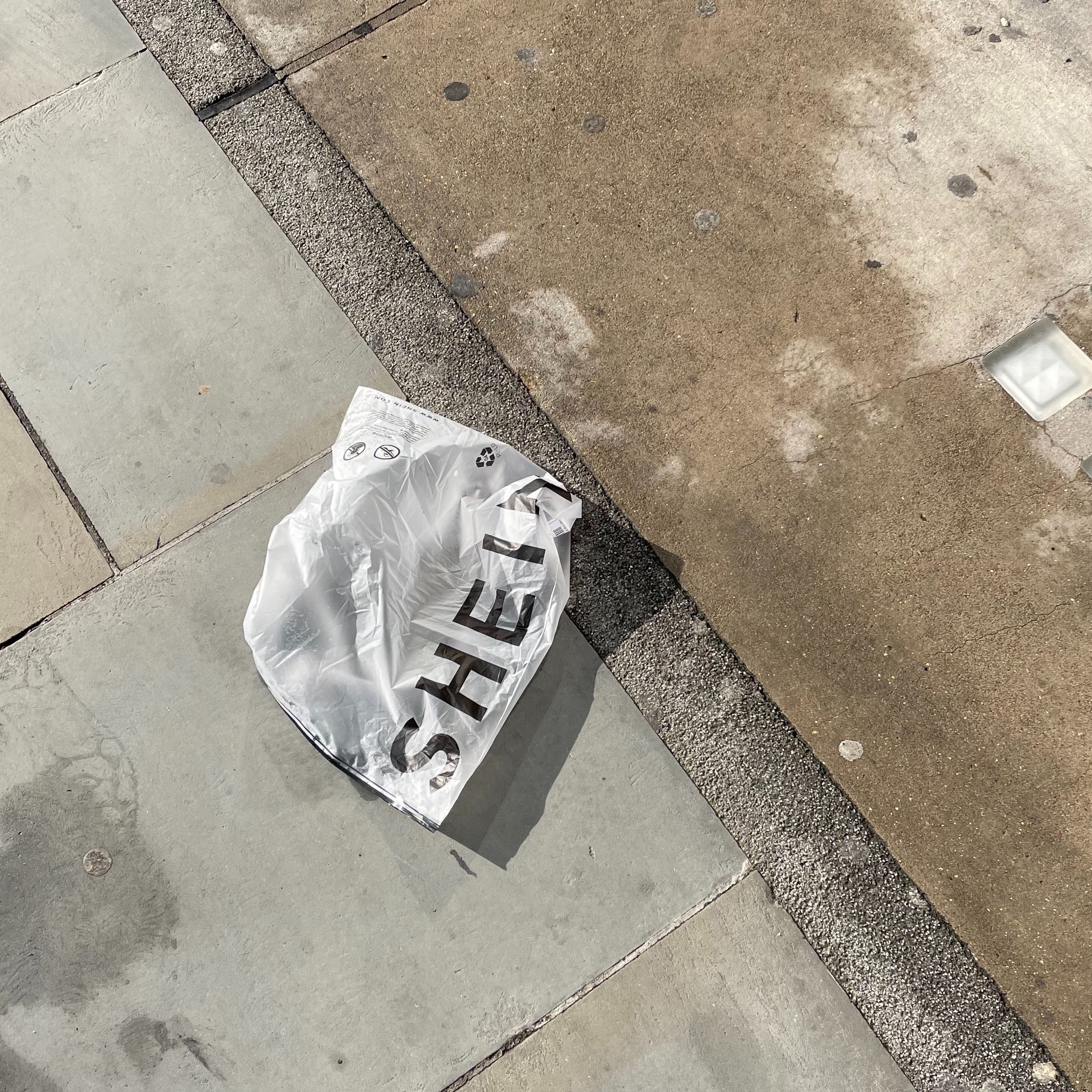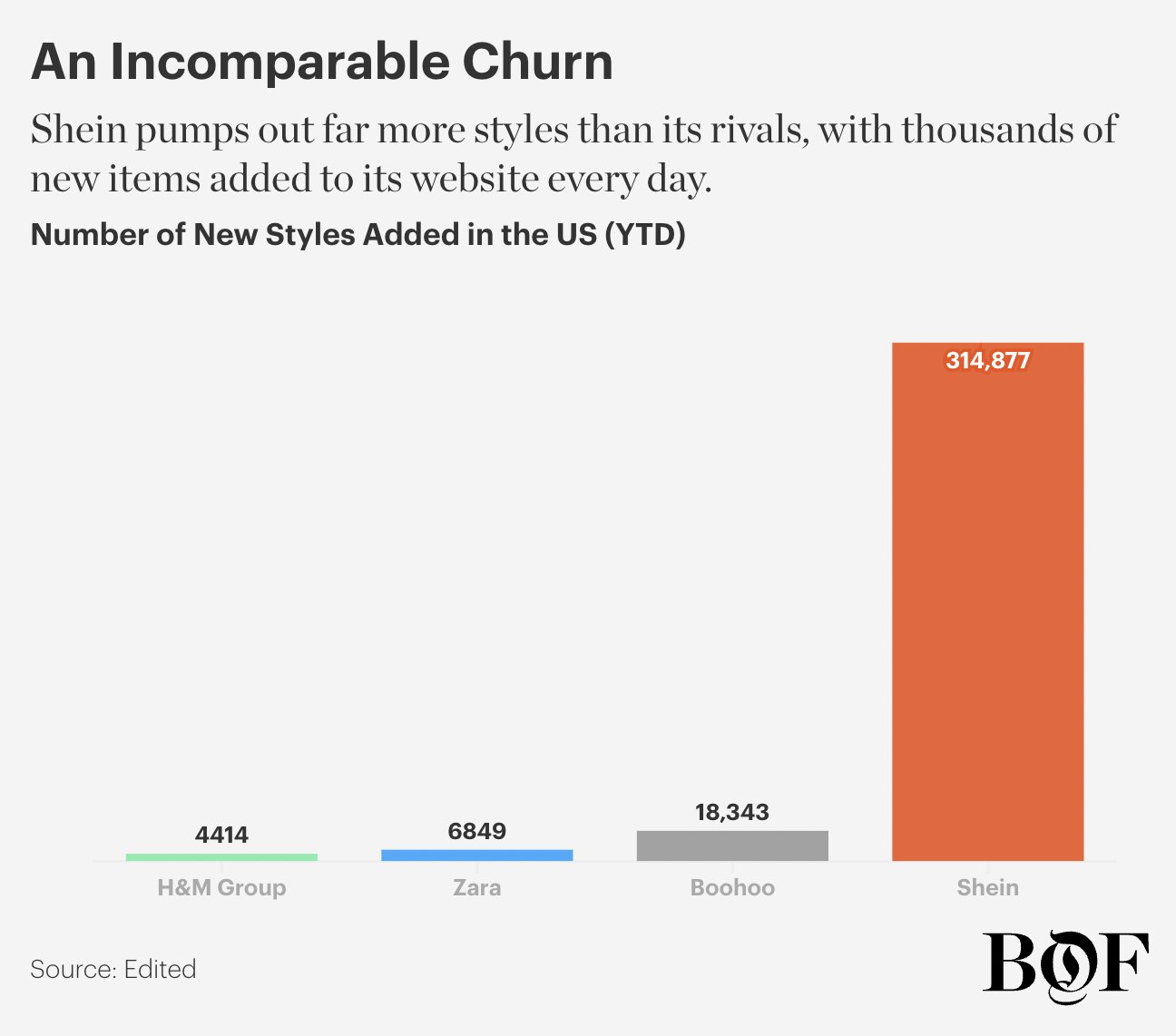Aug 4
Brand Impact: Shein

We all know fast fashion is bad, but what’s the real impact of unethical clothing companies on our world and the people that live in it?
The truth behind the negative impact of those brands we shall not name is described as generally bad for the environment and associated with unethical working conditions. But what does it actually mean when you break it down?
In this series, we’re cutting through the ambiguity and vague Sustainability Reports to analyse the true impact that fast fashion brands have on the environment, their workers and consumers. It seems only natural to start off with Shein, the notorious queen B of fast fashion.
Why are Shein so Bad?
It’s hard to tell which fast fashion brands are more harmful than others (the scale kind of goes bad to worse) but if there’s one that’s a front runner in the capitalism race - it’s Shein. Unlike their competitors, they produce clothing at an alarming rate, and not only that, the speed at which they replicate trends leads to purchases being made faster than Usain Bolt can do his 100m sprint. If you have Vinted you might be familiar with the experience of scrolling and realising the sheer amount of Shein items for sale. People buy into their trends so fast, blissfully unaware this item will be out of fashion a month later. We would never bash Vinted or any clothing resale platform, but the amount of Shein products for sale is a great way to visualize the expedited trend turnover.
Mass Production

As we said, all fast fashion is bad, but Shein seems to be doing a stellar job of being the worst. The rate they produce new garments is considerably higher than other fast fashion brands. Slow fashion advocate, Venetia La Manna, sums up the situation, claiming ‘The way Shein is making other fast fashion brands look insignificant is terrifying’. We couldn’t agree more, as Shein produces 500-1000 new items every day - compared to Missguided and Fashion Nova producing 1000 per week.
The way that SheIn is making three of the most polluting fashion brands look insignificant is utterly terrifying. pic.twitter.com/OSAU8imqtm
— Venetia La Manna (@venetialamanna) April 7, 2022
Their ultra-fast response to current trends and ever-working factories result in very low-quality items, but when Jeans cost $15 and a top just $5, most people don’t seem to care about quality. The low price justifies the buyer in their decision to throw away the item shortly after purchasing. In order for people to develop attachment or care about their clothes, they need to be priced appropriately and manufactured with care. Shein not only contributes to the overproduction of fast fashion, it normalises it, embedding it in the lives of its consumers. It becomes normal to spend a small amount of money on an item of clothing, as it will only be worn once or twice - quality is not important.
This is how the brand grew to be valued at $100 billion. A depressing figure to say the least, especially when you realise that Shein is worth more than Zara and H&M combined. The scale at which they are working is incomparable.
Labour
It will come as no surprise that Shein workers are expected to work long hours in exchange for little money and barely any time off work. But just how bad is it? A researcher discovered it might be worse than speculated. Shein workers in Guangzhou, China, are expected to work 12 hours a day (75 hours per week) with one day off per month. Other factory workers in Foshan, China reported that they work 12 14 hour shifts, 28 days a month. This breaks Chinese labour laws which state workers must not exceed 36 hours a week and must have at least one day off a week.
Only 24% of brands disclose the prevalence of modern slavery violations, suggesting Shein and many other brands similar have a lot to hide when it comes to working conditions. Sadly, it is easy for them to conceal the truth of the matter, hence the 76% of brands abstaining from sharing incidents in which they have violated their workers rights, blurring the lines between labour and slavery.
In addition to this, research showed most Shein workers migrate from other areas, meaning they have little to no choice about where they work to earn money for their family. For anyone thinking ‘why don’t they just leave’: they can’t. Why would anyone keep working there unless they had to? Shein (and other fast fashion brands) take advantage of the vulnerable state of their workers, knowing they can offer poor working conditions and low pay and they will still have employees.
In addition to all this, they use child labour and do not pay the living wage in any of their factories. No child deserves to be working in a factory for less than the living wage, having hours of their childhood robbed from them for nothing. Any company that willingly exploits children guilt-free deserves to face punishment and be held accountable.
To make matters worse, the factories are unclean and dimly lit buildings, as you would expect from Shein. Researchers claimed windows were barred with no emergency exits. Think what would happen in a fire? There’s one thing not caring about your workers - but literally leaving them with no option of escape in a fire is taking it to new and inhumane extremes.
Recruitment Fees
Most of us don’t even know what recruitment fees entail for garment workers. But with 94% of companies not disclosing the number of employees affected by them , it’s obvious they are something worth hiding. It turns out, many garment workers are indebted to their employers because of recruitment fees. Even those reimbursed by the #payup campaign are still indebted.
This puts employees in a vulnerable position. They feel they have to accept forced labour and cannot ask for an increase in pay. Transparency surrounding recruitment fees is needed to expose the leverage factory owners and fast fashion CEOs hold over garment workers.
Stealing from Designers
It’s safe to say a company that steals its designs from higher quality brands is definitely the type to steal from independent designers. Shein steals so many of their designs not just from mainstream trends, but from real artists who are trying to make their way in the fashion world. People who have studied hard and poured their heart and soul into their designs are having them stolen and tarnished by Shein.
Imitation is not always the most sincere form of flattery. Let’s put it this way- if an independent designer spends [however long] working on an original piece, which is priced fairly when taking into account ideation, time, good materials, quality and a fair profit margin to ensure everybody involved in the process is compensated appropriately, that piece may cost more than we’re used to seeing on the all–too-familiar retail sites. Now if a brand like Shein takes this design, pricing it at their average, a lot of people will opt for that one not considering what the low price-point might really mean. So not only is the idea being stolen, but to a large extent it costs the original designer potential business.
When people continue to purchase Shein items it allows the brand to continue expanding, meaning they care even less for the designers they steal from. With such a huge customer base, a small designer holding them accountable means nothing to them. As consumers, we have to be more diligent. We cannot support companies with no value or concern for their workers and designers, especially when these are the people making it possible for CEOs to earn money.
Producing Careless Designs
In the interest of churning out as many new items as they can to generate profit, Shein does not check the items they list on their website. In July 2020, they made the unforgivable mistake of selling a Muslim Prayer Mat as a ‘Frilled Greek Carpet’. The prayer mat has a picture of Kabaa, a place of great significance to Muslims as it is located in Mecca - the most sacred place in the world in the Muslim faith.
Shein apologised and removed the item from their website. However, it is baffling that something so obvious (a huge religious symbol in the center of a rug) was overlooked and sold as aesthetic homeware. How did they not consult enough people for it to come up that it was of religious significance? The lack of checks in place demonstrates the haste and urgency in which they upload items to their website. They don’t care what they sell, they are simply money hungry.
So @SHEIN_official have been selling Muslim prayer mats as 'frilled Greek carpets' despite clear imagery of #Islam's #Kaaba on some. They now issued an apology & pulled the mats line.
— Jehan Alfarra (@j_alfarra) July 8, 2020
It amazes me how a big brand, with a huge Muslim customer base btw, could drop the ball so bad! pic.twitter.com/ZaEGPBJQMl
It was not a one-time incident. Literally, 4 days after the carpet incident Shein released necklaces with a Swastika charm. Clearly learning nothing despite their apology regarding the Muslim Prayer Mats, Shein carelessly sold this offensive and antisemitic necklace. Following the inevitable backlash, their response was hardly apologetic, in fact, it blamed customers for taking offense.
Shein released a statement saying ‘SHEIN was not selling a Nazi swastika pendant, the necklace is a Buddhist swastika which has symbolised spirituality and good fortune for more than a thousand years. The Nazi swastika has a different design, it is pointed clockwise and tilted at an angle. However, because we understand the two symbols can be confused and one is highly offensive, we have removed the product from our site’
The fact the item was not listed as a Buddhist swastika suggests maybe they used this to cover up their lack of checks in place before products are listed. It seems a convenient lie to cover up their mistake. Regardless of this, which brand would deem it a good idea to sell something that could be even slightly (let alone very obviously) mistaken for a Nazi Swastika? Shein has continued to receive sales after these saddening and disrespectful scandals, in which little to nothing has been done to prove genuine sincerity.
So that was… kind of that. This is obviously a very small particle in the massive production universe that is Shein and it’s more so a way for us to answer everyone who always asks “why do people always fixate on calling out Shein?” and “other fast fashion brands are literally just as bad,” because, well, they’re not.
Anyways, don’t shoot the messenger besties? Let us know what you think on Twitter or Instagram @whering__ 💗
Something on your mind?
Share your thoughts with Whering community.
If you have an idea for an article around fashion, culture, environment, news, wellness, shopping or DIY, submit a pitch to us!